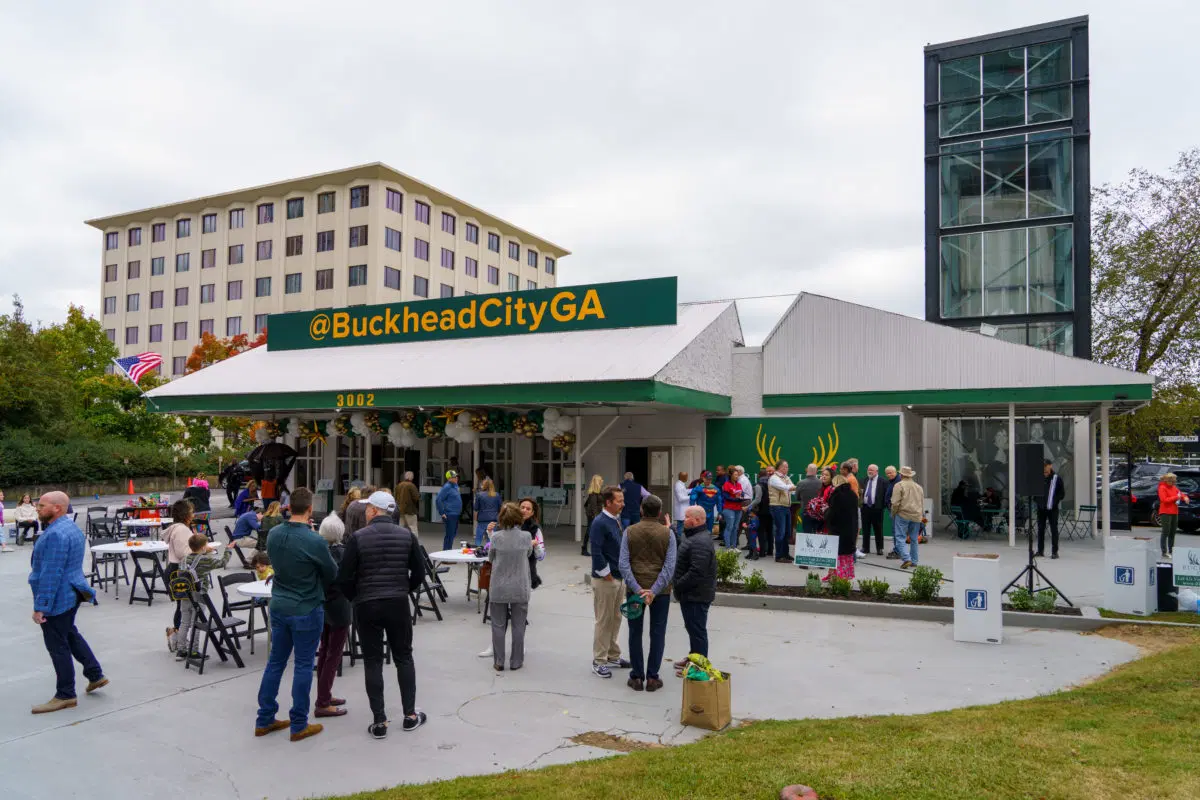
State Sen. Jason Esteves (Pictured) addresses failure of Buckhead cityhood bills, outlines other legislation addressing public safety at March 9 meeting.
Public safety was at the forefront of discussions at the Buckhead Council of Neighborhood’s (BCN) latest meeting March 9, spurred further by the recent failure of two Buckhead cityhood bills during the ongoing state legislative session. State Sen. Jason Esteves (District 6), who represents a significant portion of Buckhead, addressed those gathered in person and virtually. He discussed several pieces of legislation concerning public safety, while noting why the two proposed Buckhead City bills failed in the Senate earlier this month. Meanwhile, an update on the Buckhead Safety Alliance’s upcoming patrol of Buckhead’s commercial districts was outlined amid the backdrop of a proposed state budget item that would fund a Georgia State Patrol post in the area.
Addressing the cityhood elephant in the room shortly into his remarks, Esteves said the cityhood bills failed “primarily” due to questions surrounding the actual execution of the two proposals.
“There were constitutional questions that were raised from both inside the chamber, from lawyers inside the Legislature and also lawyers outside from the governor’s office, and from those representing different parties,” Esteves said. “Because of the fact that there were many questions around the constitutional issues, and there was a big question about whether it would actually address the concerns residents have around public safety and around city services, that failed.”
Two bills proposing the de-annexation of Buckhead and the creation of the “The City of Buckhead City” by referendum were submitted this Legislative session. For the first time, both bills passed through committee with a 4-3 vote along party lines with Republicans in support. The bills’ momentum quickly fizzled out at the State Capitol after being introduced in the state Senate due to constitutionality concerns, including from Gov. Brian Kemp’s office. On March 2, the Senate voted 33-23 with all Democrats in opposition and 10 Republicans joining their ranks to vote against one of the cityhood bills. In response, the other proposal was tabled, effectively killing the Buckhead cityhood effort for the 2023 Legislative Session — and perhaps longer. The Buckhead City Committee released a statement the group believes “there is no path forward for a cityhood referendum” with Gov. Brian Kemp in office. His second term ends in January, 2027.
Addressing crime has been the most prominent rallying cry for those supporting the Buckhead cityhood movement, and Esteves said government officials will continue addressing those concerns following the failure of the cityhood bills.
“Moving forward…there is a commitment from all the legislators who represent Buckhead to really work together with city officials, with the county…with our school board and, of course, with our residents of Buckhead to really see what we can do to continue to tackle public safety and city services,” he said.
One effort to do so has been introduced in the Fiscal Year 2024 state budget introduced earlier this week in the State House. The budget line item calls for $1.25 million to be invested for the Georgia State Patrol to open a satellite post in Buckhead. The budget item states the satellite post will “allow quicker response to incidents inside and along the northern Atlanta perimeter and afford an additional base of operation for the Nighthawks DUI Task Force.”
Though the patrol post hasn’t been finalized within the 2024 state budget, Georgia Speaker of The House Jon Burns, Gov. Brian Kemp, and Lt. Gov. Burt Jones shared their support for the proposal this week.
Meanwhile, the Buckhead Safety Alliance’s subsidized patrol for the commercial districts of Buckhead will kick off in the coming weeks. Maj. Anthony Singh, formerly of APD and tasked with the hiring of officers for the patrol, spoke at the March 9 BCN meeting. Singh said the post should be fully staffed as early as March 10 with patrols beginning either March 20 or March 27. The patrol, which will include APD patrol cars, will monitor commercial districts within Buckhead with Singh stating it will have the same policing power as the APD while focusing on commercial areas in Buckhead.
The State Senate voted down March 2 a bill that proposed “The City of Buckhead City” and a referendum allowing residents of the community to vote on creating the municipality, effectively killing the cityhood movement for now. The vote is the most recent occurrence in the Buckhead City saga that started modestly in 2020 but quickly picked up steam as a notably polarizing issue among residents and business owners. It also sets up what could be a consequential battle for future cityhood efforts statewide.

Attempts to create a Buckhead municipality aren’t without precedence as a group of disgruntled residents first floated the idea in 2008, and cityhood was brought back into discussion in 2016 during former Mayor Kasim Reed’s last term in office, which was riddled with corruption. Those rumblings continued into 2017 after Keisha Lance Bottoms narrowly defeated Buckhead resident Mary Norwood in the Atlanta mayoral race. Simultaneously, a referendum for the Eagle’s Landing community to secede from Stockbridge failed but illustrated a path for Buckhead residents to potentially cast their own vote on cityhood.
Amid a backdrop of increasing crime and some residents’ continued frustrations over city services, the idea of creating a Buckhead municipality gained momentum in 2020. The politics surrounding the issue quickly became partisan and led to the creation of two organizations — the Buckhead City Council lobbying in favor of cityhood and the Committee for A United Atlanta opposed to the municipality.
With the State Senate voting down the bill on the municipality March 2, the Buckhead City movement appears to have been put on pause for now, providing a respite for both supporters and detractors of cityhood after nearly three years of significant battles. The following are key moments in the cityhood movement leading to the bill’s failure and where the Buckhead City effort stands for the future.
First Rumblings and First Opposition
Rumors of semi-organized talk flew until finally came the emergence of the Buckhead Exploratory Committee — now known as the Buckhead City Committee — in semi-public virtual meetings. Members, who would not identify themselves, talked about a variety of options: cityhood, annexation into another city, or just sending a complaint to the mayor. They also discussed the racial implications of a majority-white neighborhood leaving Atlanta, which became a major issue of the debate, and said racists would not be welcome in the movement. Opposition quickly emerged from Bottoms, former Mayor Sam Massell, and four major local organizations: the Buckhead Community Improvement District, the Buckhead Coalition, the Buckhead Business Association and Livable Buckhead.
The BCC Goes Public
The BCC went public in a January meeting that made cityhood the focus and sought money for polling. By February it finally identified its leaders and hired lobbyists to work the legislature.
Legislation Round One
State Sen. Brandon Beach (R-Alpharetta) and state Rep. Todd Jones (R-South Forsyth) squeeze cityhood bills into the end of the legislative session. As rough-draft forms, the move largely served as political publicity.
First Forum, First Opposition Group
The first cityhood forum was held at a virtual meeting of the Buckhead Council of Neighborhoods, with White on the supporter side and Linda Klein, a Buckhead Coalition member, on the opposition side. A week later, the opposition group Committee for a United Atlanta emerged with Klein as its co-chair alongside Edward Lindsey, a former state rep. for Buckhead.
Early Polling
A BCC poll found majority support for holding a vote on the cityhood question, though it did not ask about a position on cityhood itself. The poll also revealed a deep partisan divide on the question, with local Republicans overwhelming in support and a plurality of Democrats opposed. Subsequent polls by the BCC and CUA found a continuing partisan divide, and by January 2022, the CUA reported opposition was rising and was maybe the majority position.
Dueling Studies
The BCC released a feasbility study showing Buckhead City would work in sheer revenue-and-expenditure terms. The study was a legally required step for cityhood legislation to continue moving ahead. The CUA quickly followed with a counter-study saying cityhood would blow huge holes in the City of Atlanta and Atlanta Public Schools budgets, opening other unanswered questions about bond debt and whether APS could operate legally in another city.
Political Campaigns Begin
Atlanta’s state Senate and House delegations — including all Buckhead legislators — announce they will fight cityhood bills. On Halloween, the BCC opens a campaign headquarters on Peachtree Road, which the City later cited for alleged sign violations, triggering a First Amendment lawsuit from the group. In November, Sen. Beach again pre-files a cityhood bill.
Opposition Grows
Cityhood opposition grows, with North Atlanta Parents for Public Schools saying it will back the Atlanta Board of Education’s fight against the idea, and the formation of a new grassroots group called Neighbors for a United Atlanta.
New Mayor Elected
Andre Dickens is elected as the new mayor in a late-November runoff against Felicia Moore, the more locally favored contender. However, both candidates opposed cityhood and the BCC denounced both. Dickens quickly takes a hands-on approach to countering cityhood, attending local meetings, joining opposition group events, and touting a yet-to-open police mini-precinct in Buckhead.
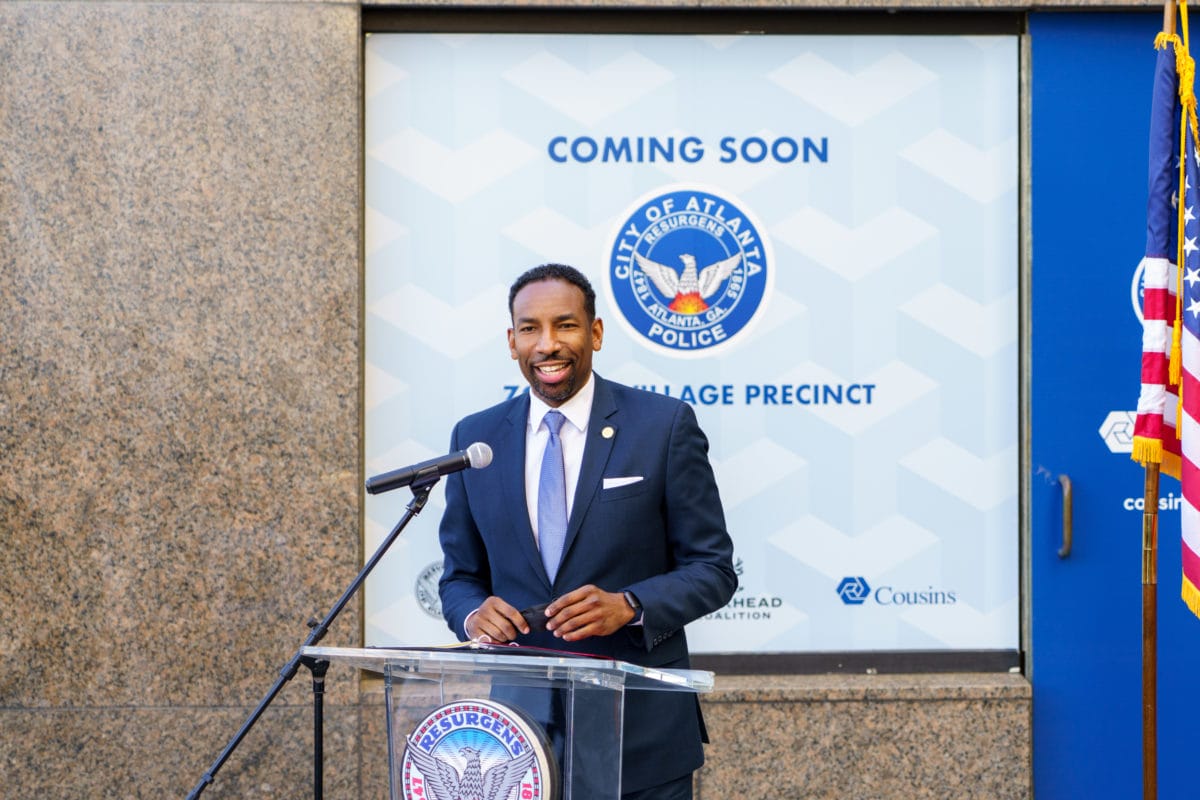
White’s social media controversies
BCC leader White was already controversial for some insulting and incorrect public commentary, and his past involvement in fundraising scandals. But he triggered widespread public outrage over racial remarks. First he called Dickens a racist, then followed up by retweeting comments from the white nationalist affiliated website VDARE attributing crime to Black populations. White apologized for the latter post, but in February again drew outrage in social media comments that spun a debate about funding for a MARTA project into a conspiracy theory that its CEO’s recent suicide was due to a non-existent theft of money.
Political Chess Games Begin
While White made incendiary comments, cityhood opponents began a political chess game. The City Council passed bond refinancing that included a “poison pill” putting a new Buckhead City on the hook for a huge payment. Lt. Gov. Duncan assigned the Senate version of cityhood legislation to all-Democrat committee, giving it bleak prospects. And Buckhead’s lawmakers plotted legislation requiring a cityhood referendum to be held citywide, not just in the neighborhood, and require a supermajority to win.
The Cityhood Movement Gets Shot Down
The push to create a Buckhead municipality was effectively quelled with then Lt. Gov. Geoff Duncan and the late House Speaker David Ralston announcing they would not allow cityhood legislation to proceed for the 2022 state legislative session. The move from some of the state’s top GOP officials resulted in the state Senate not taking up the bill, and with passage required for both chambers to include the cityhood referendum on the 2022 ballot, the cityhood movement was not introduced in the State House.
Both Ralston and Duncan announced they would not take up the issue under the Gold Dome to allow then newly elected Atlanta Mayor Andre Dickens an opportunity to reduce violent crime.
In response, the BCC said it would continue its fight with White remaining in his role leading the organization. The committee also said it would continue fundraising and urged its members and supporters to keep up the cause.
Dickens Notes A Reduction In Crime
A new APD precinct began operating in Buckhead on West Paces Ferry Road in a move to help combat crime in the area. Dickens used the opportunity to note that personal and property crime were down 12 percent year-over-year. However, cityhood supporters remained un-swayed.
Political squabbling continues
The Buckhead cityhood movement was briefly again at the forefront of political infighting after Atlanta City Council member Mary Norwood took Atlanta to task for “neglecting” Buckhead. In an op-ed published by Insider Advantage, Norwood wrote the issues concerning cityhood go beyond crime.
“It boils down to many years of Buckhead’s neglect by the city of Atlanta’s government,” Norwood wrote. She cited issues of unfulfilled requests for capital plans from the city’s government, misuse of TSPLOST funds, neglected roads, the denial of a study on potential traffic mitigation solutions, clearcutting from unchecked development and zoning complaints.
Dickens’ administration countered by stating many of Norwood’s concerns are being addressed and took issue with Norwood’s article missing “context or accuracy.”
Buckhead City Movement Passes A Major Milestone
The creation of the “City of Buckhead City” fight was fully renewed with two separate State Senate bills introduced calling for Buckhead residents to vote on de-annexation and the creation of the municipality on the 2024 ballot. Like previously proposed legislation, both bills were sponsored by lawmakers outside of the Buckhead area.
The bills outlined some key aspects of how Buckhead City would operate, including the creation of a city council with six districts. Other stipulations included sky-high payments to the proposed city’s mayor — $225,000 per year for the first four years in office. Under the proposals, the City of Atlanta would also be required to sell the new city assets at bargain prices, including $100-per-acre for parkland, $5,000 for existing fire stations and $100,000 each for the water and sewer systems under the city’s proposed borders.
The bills passed a major hurdle as they were approved by the Senate State and Local Governments Operations Committee, which voted 4-3 along party lines, with Republicans in favor, to advance the proposals. The votes marked the first time in which a Buckhead cityhood bill had advanced out of committee.
During hearings on the bills, the BCC continued to argue that those in Buckhead should be given the opportunity to vote on cityhood, while those opposed presented a litany of potential issues the bills would create.
Those concerns were brought to a head by a Feb. 28 memo from Gov. Brian Kemp’s administration outlining 11 key issues with the bills, stating they “demand evaluation for the unique constitutional and statutory challenges” they present. The memo directed lawmakers to address the issues before considering the bills. No such actions were taken publicly.
Buckhead City Proposals Fail
The incorporation of Buckhead City was killed for the 2023 legislative session on March 2 with SB 114 failing on the Senate floor. The measure was voted down 33-23 with all Democrats in opposition and 10 Republican representatives crossing the aisle to cast “nay” votes. On the same day, SB 113, another bill calling for Buckhead cityhood, was tabled by the chamber.
The Committee for A United Atlanta released a statement thanking supporters for their “major role” in the senate voting down the legislation while outlining that “many of the issues that drove this debate remain.” The letter noted the group will continue working with Mayor Dickens, the Atlanta City Council and the community to “keep the focus” on public safety, city services and that Buckhead residents have their voices heard.
Meanwhile, the BCC has seemingly called its quits on the cityhood movement, at least for now.
A BCC email sent to supporters and posted to its Facebook page said “there is no path forward for a cityhood referendum” until Kemp’s current term ends. Kemp’s term ends on January 11, 2027. The BCC’s letter alleged that Kemp’s administration worked “behind closed doors” to kill the bill.
“Although we had hoped for a different outcome this legislative session, we will continue to work for the cityhood referendum in the future,” the letter said.
With the BCC’s role spearheading the cityhood movement and the group’s announcement they are putting efforts on pause while Kemp is in office, the Buckhead City push appears to be on the backburner for at least several years. If the BCC adheres to its latest announcement, it seems unlikely any lawmakers will take up the cause with its strongest proponents seemingly unwilling to continue the fight until 2027. However, much remains to be seen how Dickens’ administration and the Atlanta City Council will address issues raised by the BCC over the coming years. Additionally, the BCC will still need to field support from lawmakers to sponsor any future cityhood bills, and there is the potential for a complete turnover of local representation over the next several years.
Legoland Discovery Center Atlanta closed its doors for renovation after Labor Day 2022, and it will reopen as the LEGO Discovery Center on March 31, 2023. The popular kids’ attraction occupies much of the third floor of Phipps Plaza opposite the AMC Phipps Plaza 14 cinema. This will be the first LEGO Discovery Center in the United States, following first one in Brussels.
Legoland Discovery Center visitors will recognize the Kingdom Quest ride, Pirate Adventure Land, and 4D Cinema, but most of the Center is being upgraded and remodeled. The Great LEGO Race VR simulator is being upgraded, and DUPLO Park has gone from a small corner of the attraction to an expansive play area where younger visitors can build and explore with their parents. General manager Jamica Butler told us, “We’ll have a bunch of games here where the young kids really start to stretch their imagination and build things, especially with their parents. We’ve never had a Duplo park this size, so I’m excited to see the happy faces.”
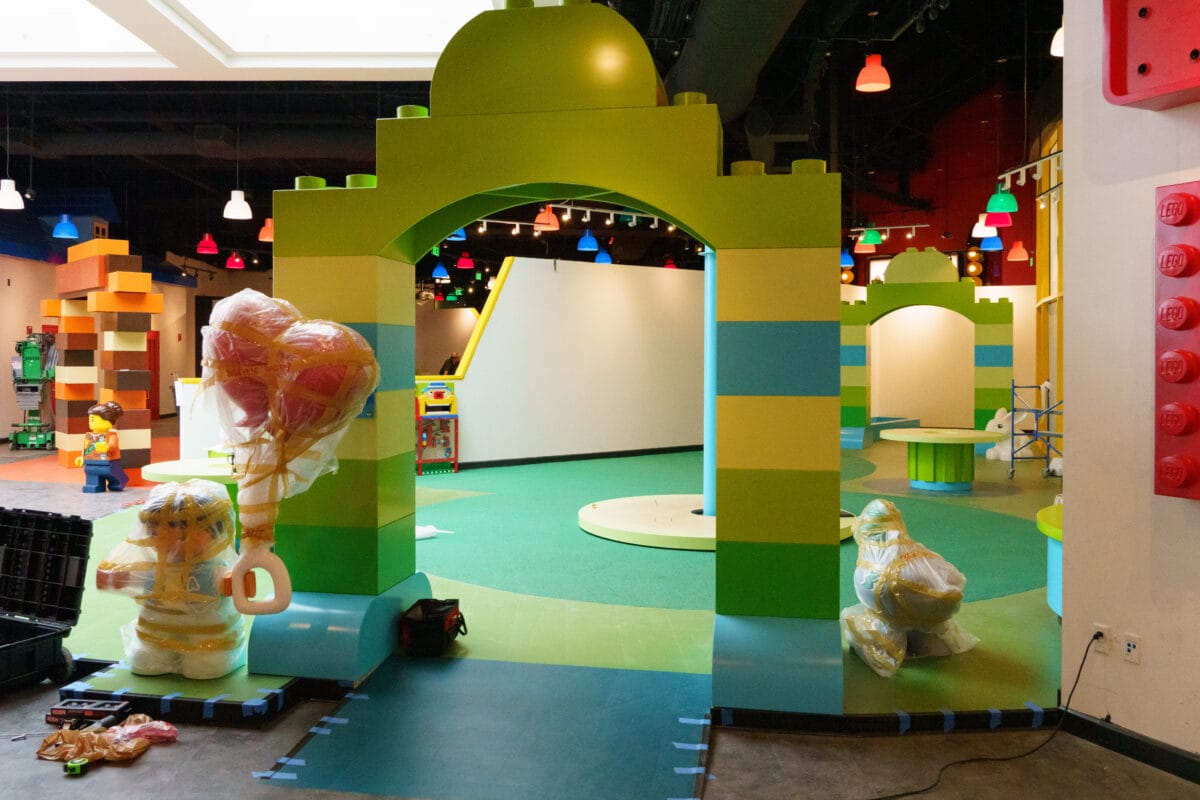
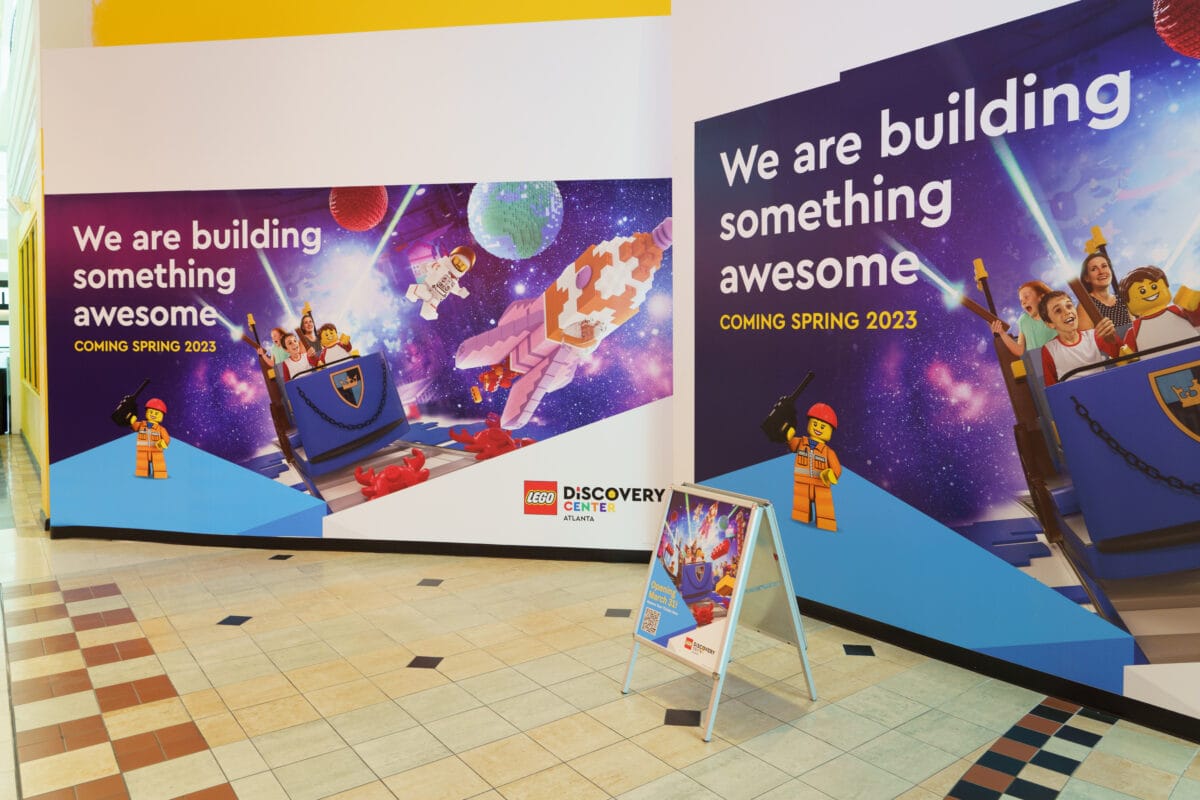
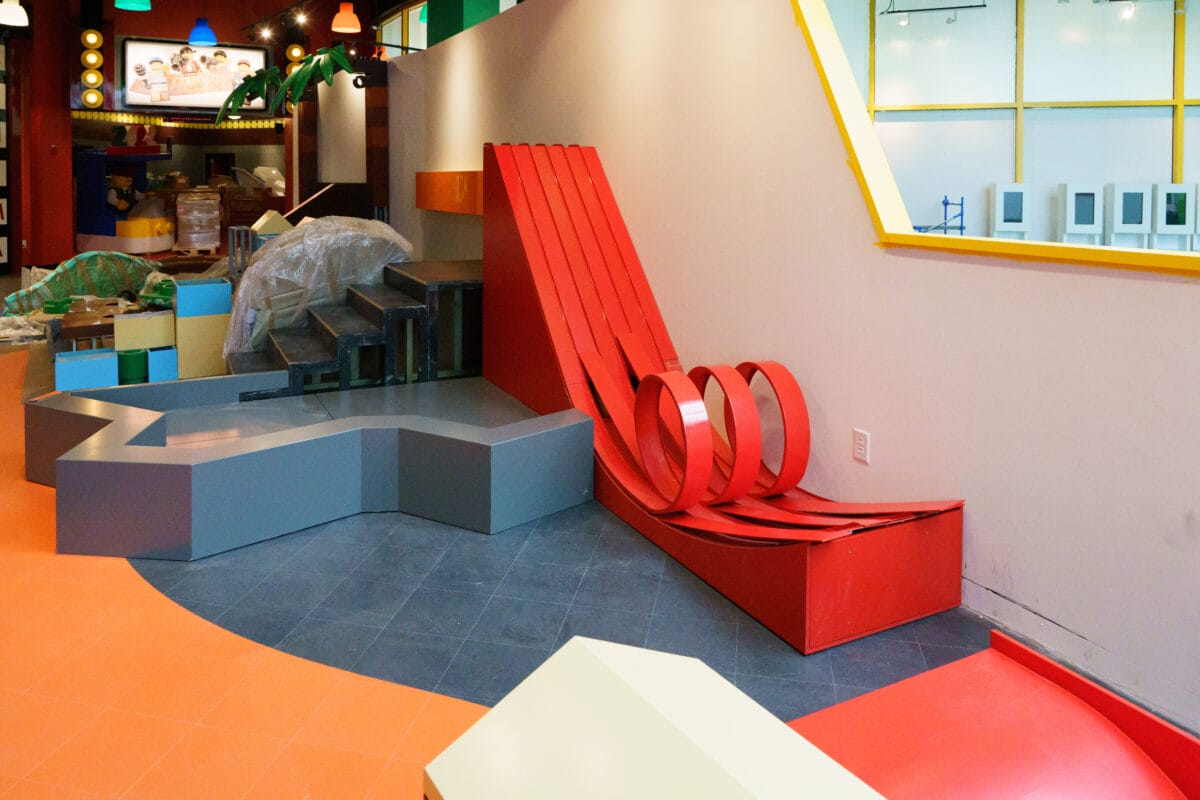
GM Butler pointed out what makes LEGO Discovery Center different from the previous iteration of Legoland. “We did a $5 million renovation to turn us into the next generation of these Discovery Centers, where parents and kids can all do the same thing together.” The family connection drives much of the new design. Butler describes the new space, “It’s filled with imagination and wonder. We have a new LEGO building scan where you can build a rocket ship. It’s something fun for all ages, parents included. We went away from just just a certain age kids. You’ll see it’s really bringing us into that whole family oriented type of place.”
The Spaceship Build and Scan is one of the new features at LEGO Discovery Center. Kids and parents build rockets with LEGO bricks, then scan their designs and pilot them using a joystick and video monitors. Build Adventures is another upgraded area where guests build, race, and jump their own LEGO creations.
Guests will notice a lot of changes in the Miniland section of LEGO Discovery Center. This intricate LEGO model of Atlanta landmarks is the creation of Master Model Builder Phillip Quinn-Simmons. I asked Quinn-Simmons how long it took to build Miniland, and he replied, “Everything takes forever all the time.” He continued that a project like this is made up of “Really small pieces and really big builds,” and the time involved varies. The new Zoo Atlanta model took about 6 weeks, in which Quinn-Simmons was sitting in the model “like an animal on display.”
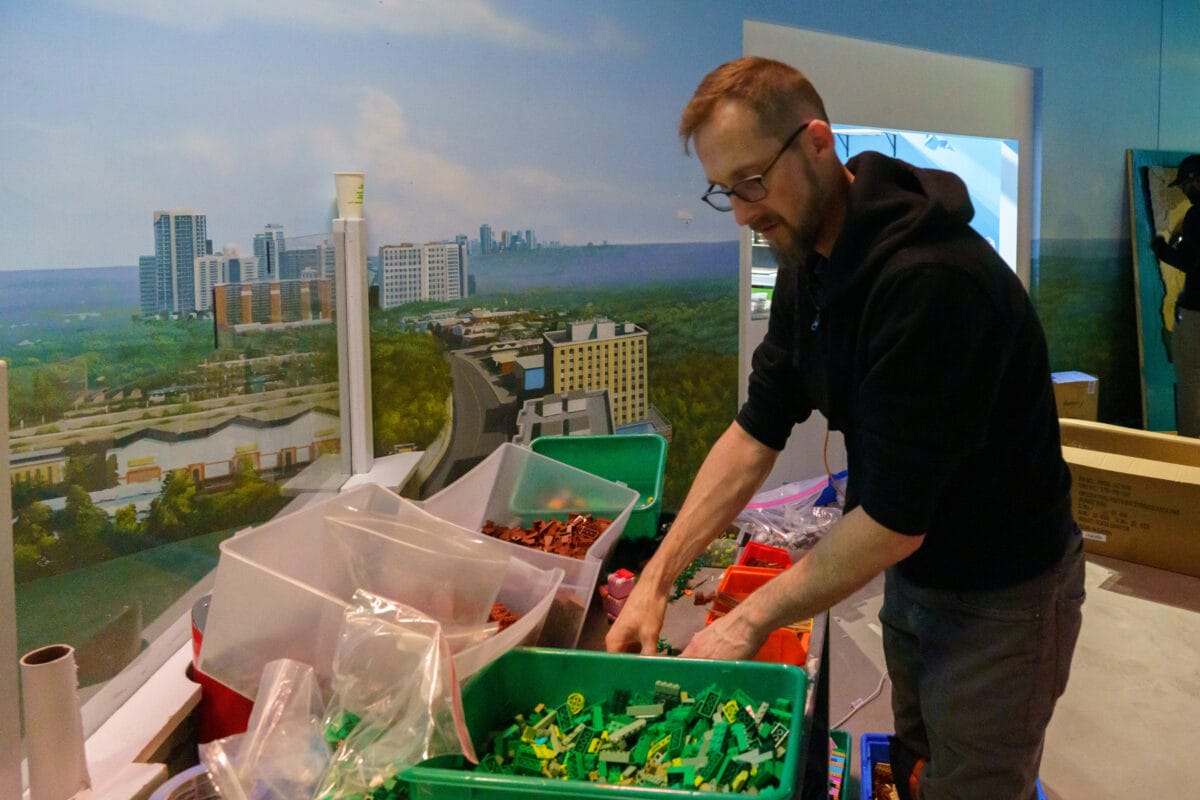

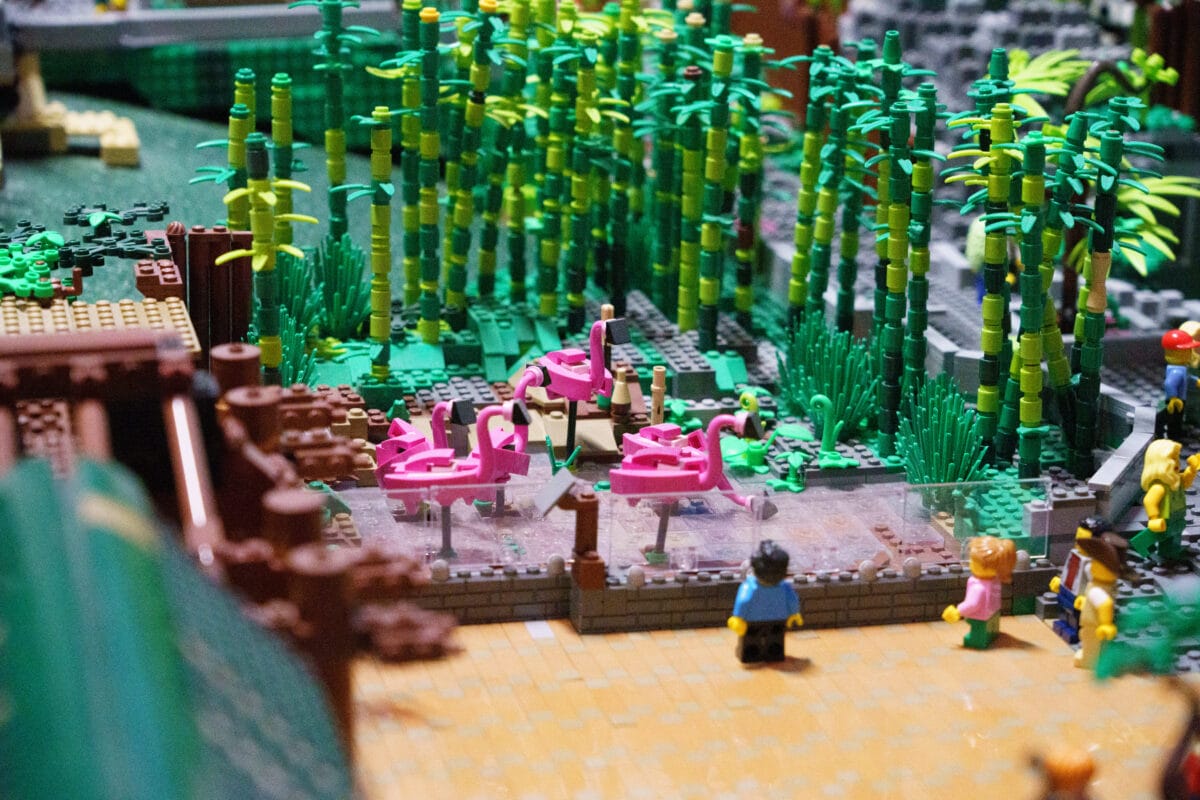
Quinn-Simmons has been working with LEGO professionally for 5 years. His 3 years at LEGO Discovery Center were preceded by 2 years of teaching STEM classes using LEGO bricks. To build the models in Miniland, he photographs the locations, then builds each model from scratch using his photos for reference. He says he completes these highly detailed builds by having a “quantum understanding of how the pieces work, and knowing how it all goes together.”
Quinn-Simmons and his team add details and fun extras that bring the models to life after the main models are done,. Guests can interact with the models to activate movement and lights. I hear there are a lot of secret details hidden throughout Miniland.
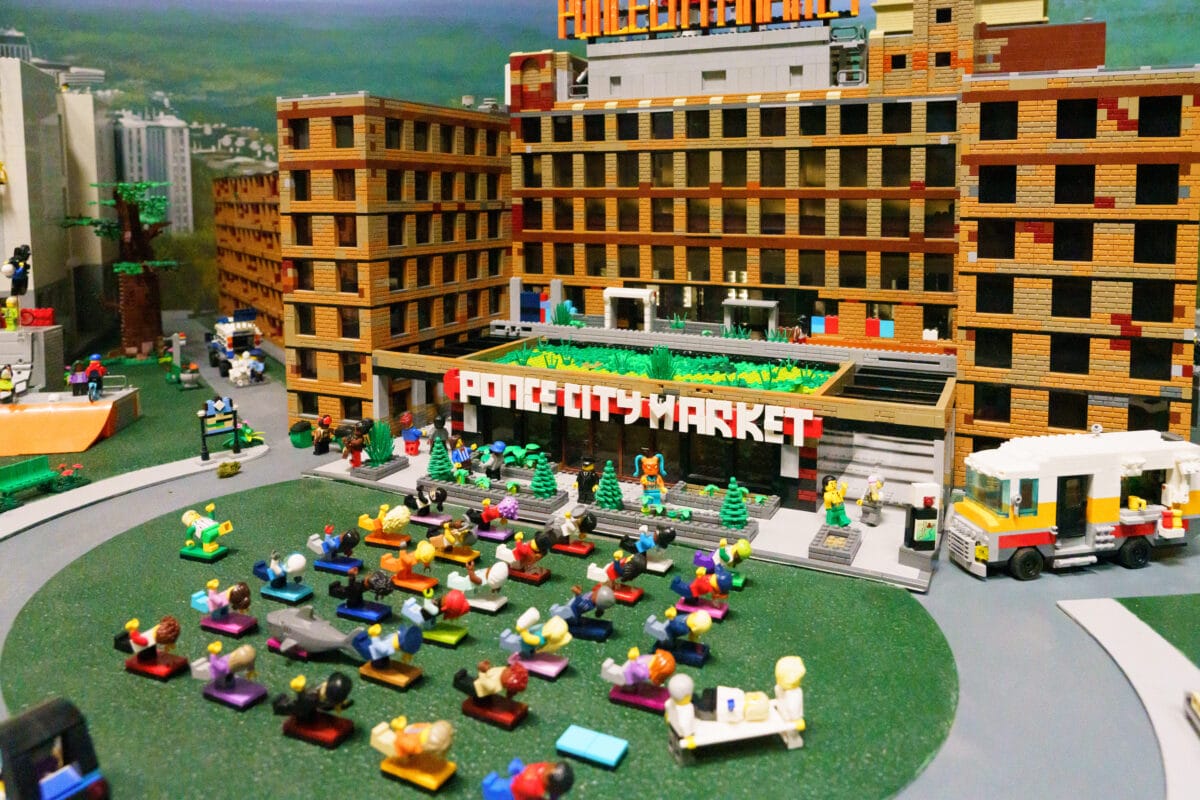
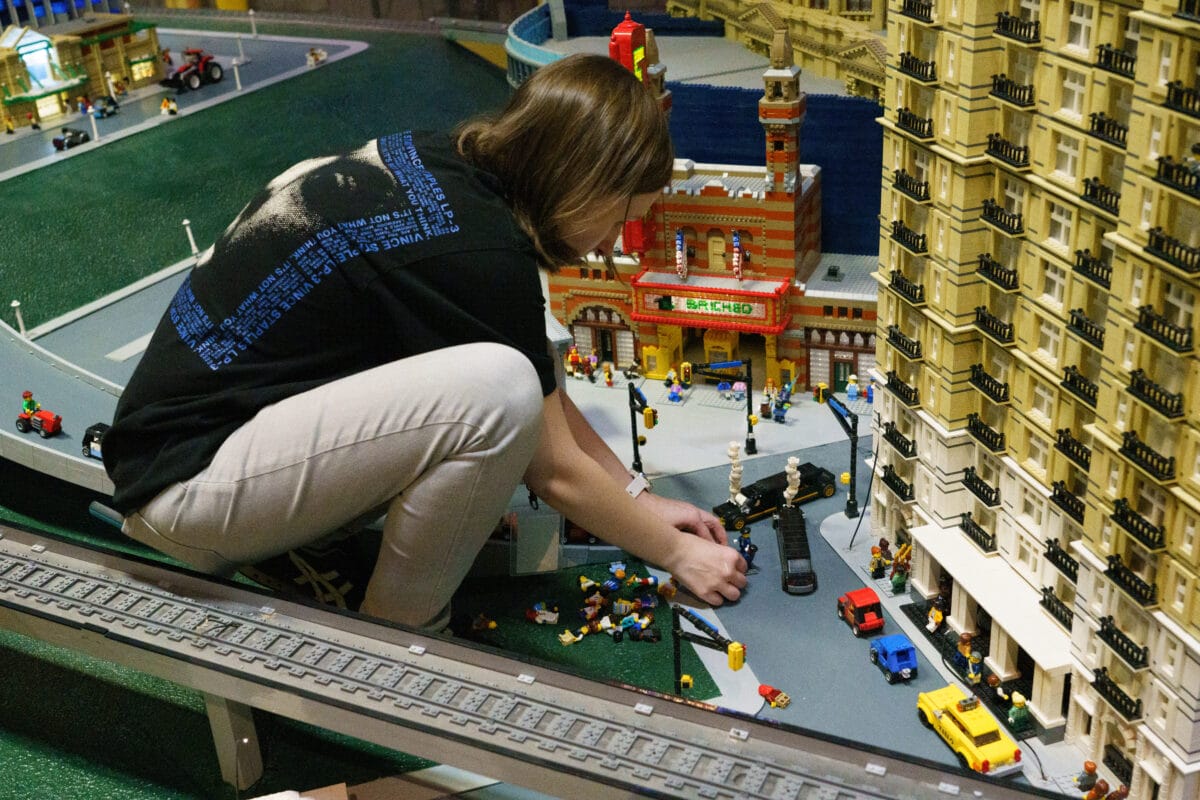
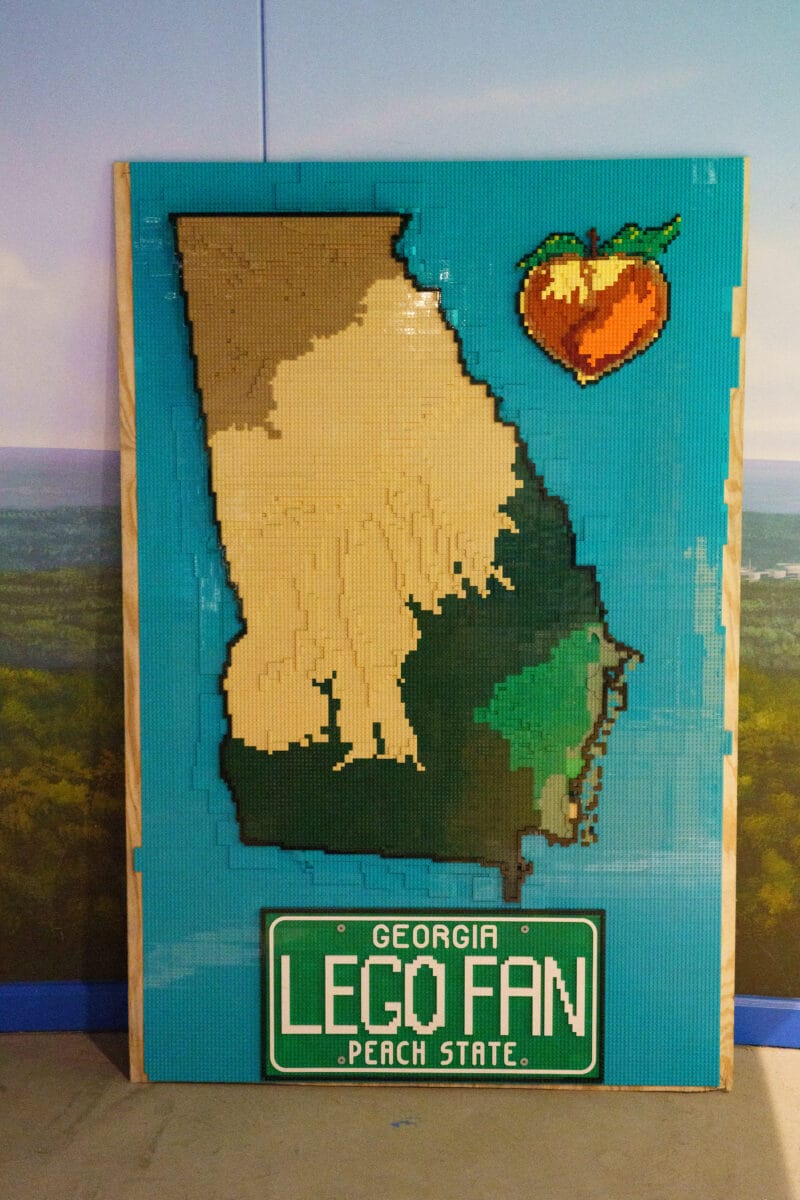
Guests at LEGO Discovery Center will have new opportunities to interact with the Master Model builder. GM Butler told me, “Our master model builder has a new guest facing office where he’ll have sliding windows where guests can come up and build with him, hang out with him, and see what’s new.” The remodeled LEGO shop also includes demonstration areas where Quinn-Simmons will do presentations and building demos.
The LEGO shop includes LEGO model kits, loose bricks for sale, and a new minifigure creator. Guests can design a custom minifigure that is printed right there in the store. This goes beyond just picking pre-printed pieces and assembling a minifigure!
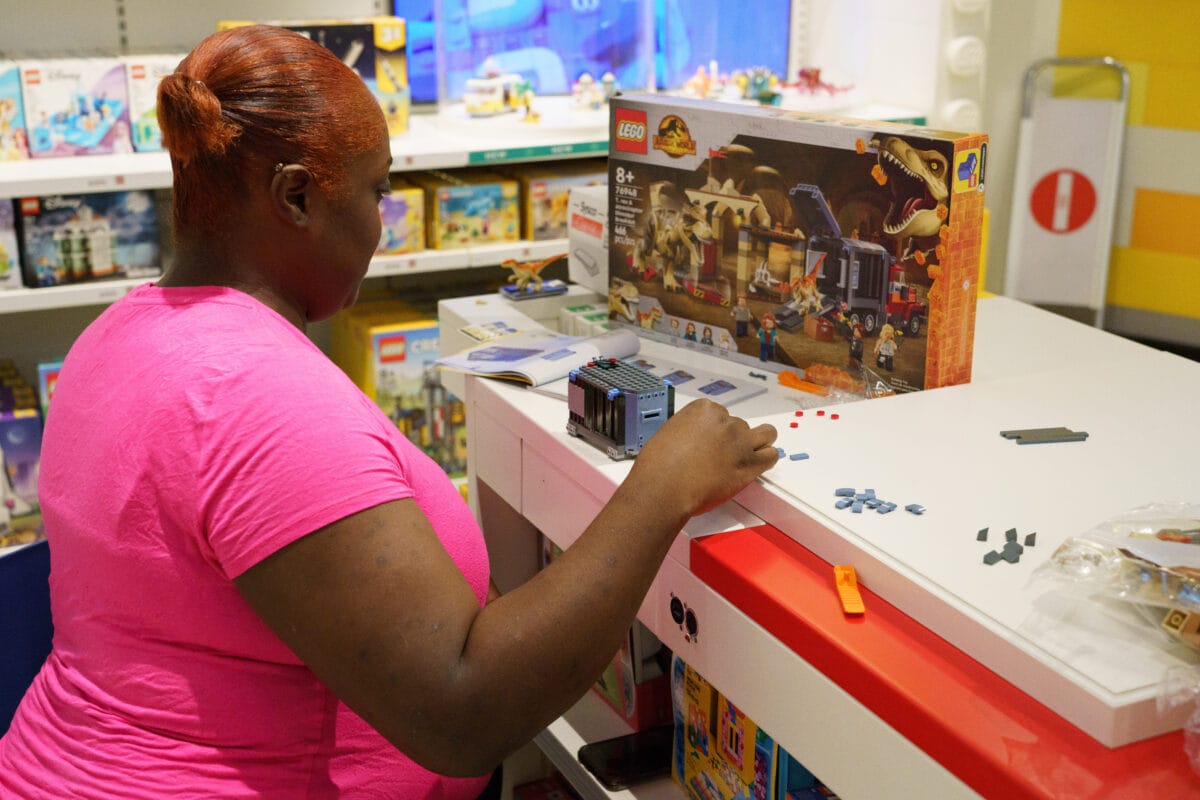
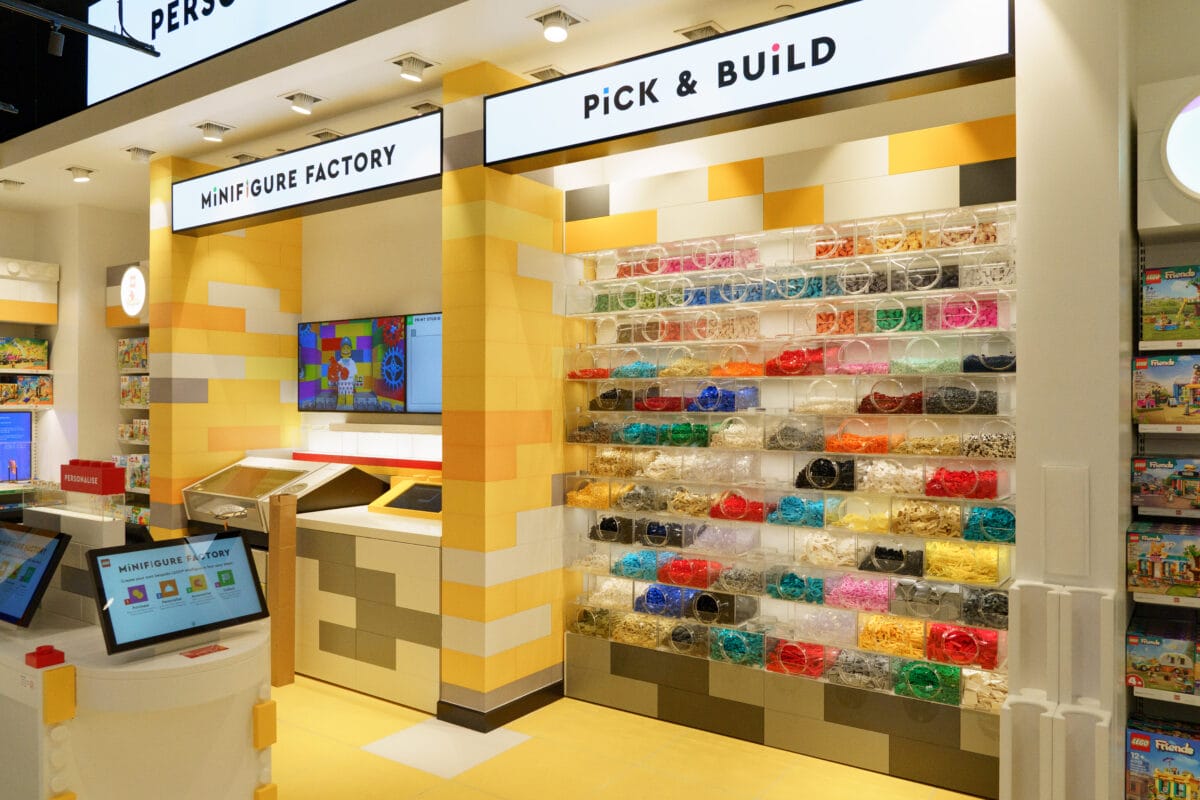
LEGO Discovery Center is designed to be more accessible and inclusive. The ticketing process has been streamlined for easier entry, and a lot of thought has been put into the minifigures on display. GM Butler told me, “The cool thing about our transition into this next generation LEGO Discovery Center is if you look at all the minifigures, they’re so diverse. We have older people minifigures, we have professors, we have people in wheelchairs with disabilities. Minifigures of all different types of people.” She sees this as an evolution of the LEGO tradition. “I don’t think Lego ever goes anywhere. It just continues to evolve. And we were evolving.”
Learn more at legodiscoverycenter.com/atlanta